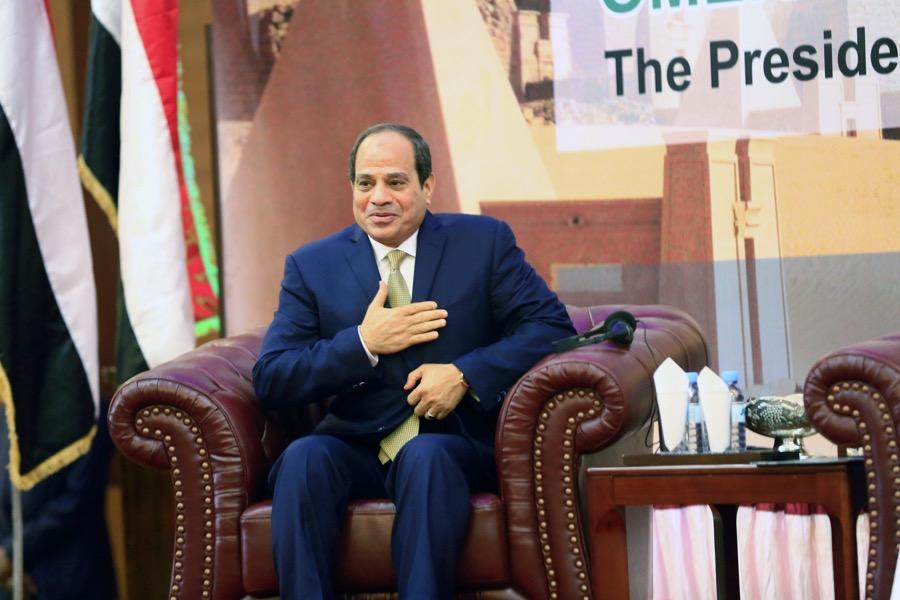Trump praises ‘fantastic job’ of Egyptian leader widely accused of human rights violations
Egypt's President Abdul Fattah al-Sisi in Khartoum, Sudan, on Oct. 10, 2016.
US President Donald Trump set human rights scandals aside to welcome Abdul Fattah al-Sisi to the White House Monday, the first such visit by an Egyptian president in almost a decade.
Greeting Sisi warmly in the Oval Office, Trump heaped praise on the former general's leadership and unleashed a charm offensive designed to mend ties strained by crackdowns, revolution and revolt.
"You have a great friend and ally in the United States and in me," Trump told Sisi, sweeping aside his predecessor Barack Obama's concerns about the Sisi government's purge of political opponents and rights activists.
"I just want to let everybody know that we are very much behind President al-Sisi — he has done a fantastic job in a very difficult situation," Trump said.
The meeting symbolizes the Egyptian leader coming in from the cold, after years of being kept at arm's length by Washington.
Related: Some Egyptians are comparing Trump to an unlikely, Islamist figure
The last time an Egyptian president was at the White House was in 2010 when Hosni Mubarak attended Middle East peace talks alongside Israeli, Palestinian and Jordanian leaders.
Within months, Mubarak was ousted by a popular uprising, as the Arab Spring swept across the region.
The revolt gained tacit support from Obama, who warned the military against quashing protests by force.
In the months and years that followed, the Egypt-US relationship was strained further as a broadly Islamist and then a military government — led by Sisi — took charge.
The Obama administration froze military aid to Egypt — worth roughly a billion dollars a year — after then-defense minister Sisi led the 2013 ouster of President Mohammed Morsi, and a bloody crackdown on his supporters.
Egypt's key role as the most populous Arab nation meant that aid was fully reinstated in 2015, but diplomatic relations remained difficult.
The catalyst for Trump and Sisi's friendship has been a common hardline stance against jihadist groups, which Sisi described as "a satanic ideology" during brief remarks at the White House.
The former New York property tycoon and the former Egyptian army general, who do not plan to hold a joint press conference, previously met in September when Trump's campaign was still in full swing.
Trump at the time called Sisi a "fantastic guy."
Sisi was reportedly the first to call Trump to offer his congratulations on his November election win.
'Discreet' talks on rights?
Monday's meeting offered some insight into how the Trump White House plans to address the issue of human rights.
In one of several public appearances, Trump said "we have many things in common, We have a few things that we don't agree on."
"I think that this is going to be a very productive day," he said.
Asked directly whether human rights were discussed, Trump declined to answer.
Ahead of the meeting, a senior administration official said the topic would be handled in a "private, more discreet way."
"We believe it's the most effective way to advance those issues to a favorable outcome."
That stance was slammed by rights groups, who say tens of thousands of opponents have been arrested or facing criminal charges.
"Inviting al-Sisi for an official visit to Washington as tens of thousands of Egyptians rot in jail and when torture is again the order of the day is a strange way to build a stable strategic relationship," said Sarah Margon, Washington director of Human Rights Watch.
The White House, which recently unveiled a budget that proposes drastic cuts in international aid, has pledged to maintain a "strong and sufficient" level of support for Egypt, without committing to any specific figure.
The new Republican administration is also considering whether to designate Morsi's Muslim Brotherhood group as a terror organization.
Trump "is interested in hearing President al-Sisi's views on the Muslim Brotherhood issue," the senior administration official said.
"We, along with a number of countries, have some concerns about various activities that the Muslim Brotherhood has conducted in the region. But that's going to be a discussion that will unfold between us and Egypt."
Related: These young Egyptians led a revolution. Now their frustrations are mounting under Sisi.
Making peace
The thorny issue of the Palestinian-Israeli peace process was also expected to be on the agenda.
Egypt and Jordan are the only two Arab states to have signed peace treaties with Israel and would likely be considered key players in any renewed peace effort.
Jordan's King Abdullah will visit the White House on Wednesday.
Trump has sent mixed signals over how he will address the peace process, deadlocked since April 2014.
He broke with decades of US policy during a meeting with Israeli Prime Minister Benjamin Netanyahu in February when he declared that he was not bound to a two-state solution, meaning an independent Palestinian state alongside Israel.
Trump said he'd be open to a single state if it meant peace. But he also called on Israel to "hold back on settlements for a little bit."
By AFP's Andrew Beatty
